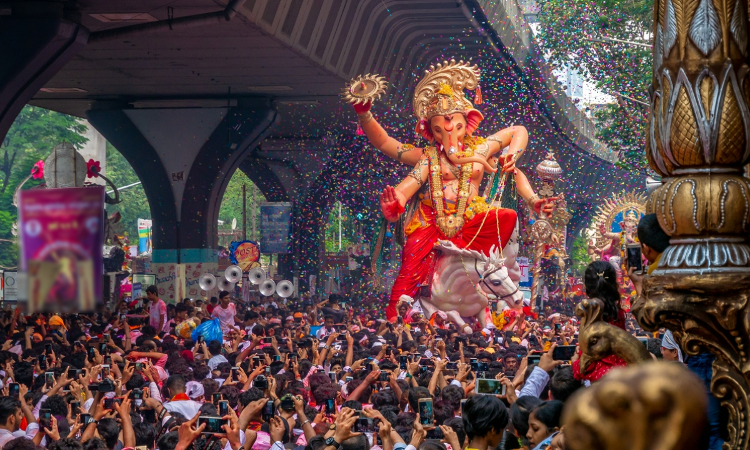- Home
- /
- High Courts
- /
- Madras High Court
- /
- 'God Can't Be Tool For Rivalry Or...
'God Can't Be Tool For Rivalry Or Social Dominance': Madras High Court In Pleas Seeking Installation Of Ganesha Idol
Upasana Sajeev
27 Aug 2025 10:58 AM IST
Disposing of a batch of pleas seeking permission to install idols of Lord Ganesh in connection with Vinayaka Chaturthi celebration, the Madras High Court remarked that most of the requests were driven by ego clashes and a desire to show dominance. Justice B Pugalendhi deprecated the practice of using divinity to settle personal scores and remarked that God was a symbol of unity, not...
Disposing of a batch of pleas seeking permission to install idols of Lord Ganesh in connection with Vinayaka Chaturthi celebration, the Madras High Court remarked that most of the requests were driven by ego clashes and a desire to show dominance.
Justice B Pugalendhi deprecated the practice of using divinity to settle personal scores and remarked that God was a symbol of unity, not a tool for rivalry.
“This Court cannot ignore the underlying motivations in some cases. Most of the present requests appear to be driven by ego clashes and a desire to assert monetary influence, rather than genuine religious intent. This Court strongly deprecates the practice of roping in divinity to settle personal scores or display social dominance. God is not a tool for rivalry; He is a symbol of unity, peace, and spiritual elevation,” the court remarked.
The court also observed that most of the temples at street corners were neglected throughout the year but during the time of Vinayaka Chaturthi, elaborate efforts were made to install giant idols. Calling this a paradox, the court said that the devotees must introspect and understand that true devotion was not about grandeur but consistent reverence and upkeep of places of worship.
The petitioners whose representations were not considered or denied submitted that the decision of the authorities infringes their fundamental right to worship under Article 25 of Constitution. It was also submitted that while permission was granted to some individuals in the same locality, it was arbitrarily denied for the petitioners. They also assured the court that no law and order issues would arise if installation was permitted and they were willing to comply with all the guidelines.
Opposing the request, the State submitted that the petitioners had approached them at last minute, leaving insufficient time for administrative preparation. The State also informed that permission had been granted to other groups in the same locality and the present request was motivated by ego.
Though the court observed that installation of Ganesha idols and their immersion was a legitimate expression of religious faith, it also observed that sudden or late night installation of idols in public places often create avoidable strain on police and administration. The court highlighted that if idols are installed without proper planning, there was a risk of something untoward happening. The court thus highlighted that the administration must remain vigilant and provide protection in such cases.
“Past experiences during public festivals have shown that sudden or late-night installations of idols in public places often create avoidable strain on the police and administration. Once idols are placed at street corners or open spaces without prior planning, there is always a risk that at odd hours disturbing incidents may occur. Such incidents can inflame passions and disturb peace. Therefore, it is not only reasonable but necessary that the police and administration maintain vigilance and provide protection wherever required,” the court said.
The court also made it clear that last-minute applications for the installation of idols should not be entertained, especially when they require coordination among multiple departments. The court observed that the right to worship must be exercised with responsibility and foresight.
The court also noted the environmental concerns that were involved in the installation and immersion of Ganesha idols. The court noted that devotion to God could not be allowed to result in disturbance to man or destruction of nature. The court highlighted that true worship lied in harmony among communities through peace and order, and harmony with creation through protection of the environment.
The court held that no permission could be granted for immersion unless the applicants obtained a certificate from the Pollution Control Board, confirming that the idols were free from banned pollutants and harmful substances.
Since the court could not deal with all petitions due to paucity of time, it directed the authorities to consider/reconsider the applications and grant permission strictly subject to conditions. The court said that where an applicant had installed an idol in the previous year and had a proven record of compliance, the application could be considered. Whereas, an applicant who approached the court belatedly and whose intent was doubtful should not be granted permission.
The court also directed the officials to ensure that idols are immersed in an eco-friendly manner, after ascertaining the quality of the water before, during, and after the immersion. It asked the authorities to ensure that immersion should not be permitted in such a manner to pollute the water bodies— which are not just meant for humans but all other living beings.
Case Title: S Kumar v. The Commissioner of Police
Citation: 2025 LiveLaw (Mad) 287
Case No: WP.Crl.(MD)Nos. 1086 of 2025 etc batch cases



